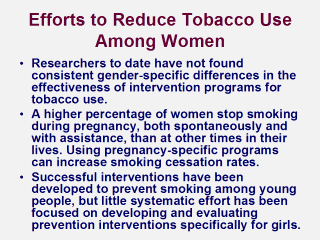 |
Using
evidence from studies that vary in design, sample characteristics, and
intensity of the interventions studied, researchers to date have not found
consistent gender-specific differences in the effectiveness of intervention
programs for tobacco use. A higher percentage of
women stop smoking during pregnancy, both spontaneously and with assistance,
than at other times in their lives. Using pregnancy-specific programs can
increase smoking cessation rates, which benefits infant health and is cost
effective. Only about one-third of women who stop smoking during pregnancy
are still abstinent one year after the delivery.
|
